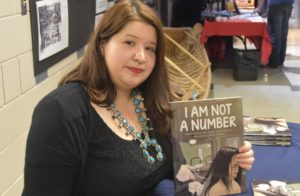I Am Not a Number tells Granny’s Indian Residential School story

By Kelly Anne Smith
NIPISSING FIRST NATION—Nipissing First Nation author sells out at book signing–again.
An academic and now a best-selling author, Jenny Kay Dupuis signed books and greeted many community members during Nipissing First Nation’s annual meeting, Maawjidwin Nji-Wiidooktaadyang, at Nbisiing Secondary School in Duchesnay.
Dupuis’s book is based on her grandmother’s experience. In 1928, Irene Couchie Dupuis and her two brothers were taken from their parents on Nipissing First Nation to Spanish Indian Residential School.
The book portrays the trauma her Granny endured in the Indian Residential School System.
Dupuis had an opportunity to meet with the owner of Second Story Press.
“She is the one who gave me the opportunity to tell my Granny’s story. We started talking about my life growing up,” stated Dupuis. “She asked about historical connections and political ones. I was active in Indigenous Youth issues globally and she wanted my story, but I wanted to tell Granny’s story. History was silent when it came to residential schools as well as a lot of other Indigenous realities.”
Dupuis was challenged with the thought of writing the book.
“It took me a year to say yes to it because I’m not formally trained as a writer and also, I wanted to make sure I had the permission from the family with having the story shared,” added Dupuis.
“It was at Christmas. I was about 14 going on 15 when my Grandmother shared her story with my sister and I. My sister was attending McGill University and doing work on Native studies. My Grandmother wanted to clarify what residential school really was. So I carried that information all those years, not really understanding what the Residential School System was,” recalled Dupuis.
Dupuis eventually learned about it when she was in her 20’s through her own journey of education which included opportunities to work with Survivors.
“There is a gap in the education system and not just when it comes to residential schools,” noted Dupuis. “I couldn’t understand at the time when she was telling me about why kids needed to be taken away from their families and I couldn’t understand why there was so much pain involved. And why there was loss involved with it as well.”
“It took me a lot of years of asking questions,” continued Dupuis.
Dupuis recalls supporting teachers at the school board level in Hamilton with visiting the former Mohawk Institute.
“We invited Survivors,” added Dupuis. “And then a few teachers helped to create a play and I helped with the education piece for the students.”
Her doctorial work in educational leadership focuses on Indigenous education.
“I was digging deep going through archives and photos and talking with Survivors. I also learned the impact the Indian Act has on Indigenous People,” recalled Dupuis. “Not just on my own life, there are aspects of gender discrimination, but that there are policies that took young kids away from their homes. The intent was to assimilate them so they wouldn’t return to their home communities.”
Dupuis converses often with librarians, teachers and educators.
“My focus really is on how to change the hearts and minds of how to teach,” stated Dupuis. “What should you be teaching, and what should you be focusing on? This book, in my opinion, is an entry point to start exploring a whole bunch of other issues that are buried within the Indian Act policies.”
Sharing old memories for research stoked the family fire of connectedness for Dupuis; she says the compilation of her Granny’s history involved spending a lot of time with her family who recalled stories for her.
She is especially thankful to Les Couchie who shared an old photo collection. Les Couchie’s father is in the book.
“Overall, the writing of the book helped to bring family together,” stated Dupuis. “When we first started writing the book, I was really nervous about coming out with it. This was three years ago. This is back in a time when people believed that this was truth. There were actually letters written about how we shouldn’t write the book by people who were in denial. It takes a lot to keep going while knowing that a story like that has to be shared.”
Exceeding expectations after launching in September, I Am Not a Number is going into a third print in Canada. It has been launched in the US and is already on a starred book list for libraries.
I Am Not a Number sold out at the Nipissing First Nation Annual Gathering. The book was also sold out in Sudbury before that book-signing event.
Dupuis stays in Beaucage while in Nipissing First Nation territory and is now settled in Toronto supporting the writing of Indigenous curriculum. Her work has taken her across the country working in communities supporting Indigenous education.
“Through that, I made an effort to always listen and learn,” noted Dupuis.

